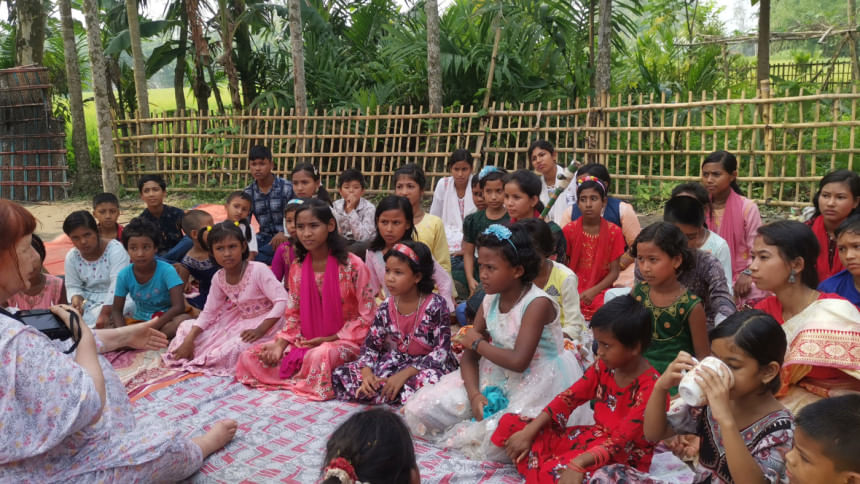A song for the soul

In the remote Sonahat village under Kaliganj upazila of Lalmonirhat, a chorus of young voices singing could be heard from afar -- "Manush Bhajle Sonar Manush Hobi" (If you preach humanity, you'll become a person with a heart of gold).A small signboard outside a tin-roofed house read "Karmoloy Gurugriha". Inside, around 60 to 70 children sat on mats. Some were playing the harmonium, some practising rhythm on the dotara (a two-string local instrument), while others were either singing or playing i...
In the remote Sonahat village under Kaliganj upazila of Lalmonirhat, a chorus of young voices singing could be heard from afar -- "Manush Bhajle Sonar Manush Hobi" (If you preach humanity, you'll become a person with a heart of gold).
A small signboard outside a tin-roofed house read "Karmoloy Gurugriha". Inside, around 60 to 70 children sat on mats. Some were playing the harmonium, some practising rhythm on the dotara (a two-string local instrument), while others were either singing or playing instruments like flute, mandira, and ektara.
Villagers stood around, mesmerised by the melody.
"At our Gurugriha, we conduct classes twice a week -- on Fridays and Saturdays -- where we teach folk songs and traditional instruments. Children from rural areas usually have no access to cultural education, so we're trying to give them that opportunity here," said Guru Nityananda Roy, the instructor.
"Mayer Tori", a cultural organisation, runs the music school. As part of the initiative, over 500 children in several remote villages across Lalmonirhat and Kurigram districts are learning traditional Bangladeshi folk genres such as Lalon Geeti, Marfati, Murshidi, Bhawaiya, Palli Geeti, and other forms of rural songs.
The children are also learning to play traditional instruments including dotara, ektara, khamak, sarinda, tabla, flute, Bangla dhol, and violin.
Suraloy Gurugriha in Dewdoba village under Aditmari upazila of Lalmonirhat is also engaged in a similar effort under the initiative.
Guru Lopideb Nath, instructor at Suraloy Gurugriha, said, "Our students are dedicated. They don't just learn songs; they learn values -- respect, compassion, and empathy."
In Halmajipara village under Kurigram's Phulbari upazila, Fakirul Islam instructs children under the initiative.
"Most of our students come from working-class families. Through folk music, they dream of a brighter life. We are proud of them," he said.
Norwegian poet, photographer, and researcher Wera Saether, deeply moved by Bangladeshi folk culture, founded Mayer Tori in 2016 in collaboration with local cultural activists, disseminating musical training to children across nine Gurugrihas in the two districts.
About 460 children are receiving singing lessons, while another 125 are learning to play musical instruments at two training centres. For advanced learners, there is a special "Tori Class" where they gain deeper knowledge of different branches of folk music.
"Mayer Tori is not merely an institution; it is a movement," said its director, Sujon Kumar Bed.
Organiser Yusuf Alamgir said, "Our philosophy is self-realisation and enrichment through the practice of folk music. We aim to revive the lost sounds and rhythms of rural Bengal."
Talking to this correspondent, Wera Saether, founder of Mayer Tori, said she had been greatly moved by the region's folk musical tradition during her visit to Uttar Namajerchar village under Kurigram's Roumari upazila in 1998.
Her experience led her to work with local folk artistes and establish Mayer Tori in 2016. She also translated 53 Lalon songs into Norwegian and published them in a book.
"In today's world -- amid wars, greed, and environmental destruction -- it's hard to keep people mentally healthy. I believe the songs of Lalon, as well as Baul, Marfati, and Murshidi songs, can guide humanity back toward love and peace," she said.
"That's why I started Mayer Tori with cultural activists of northern Bangladesh -- to teach music, and more importantly, to raise children as humane individuals," Wera added.